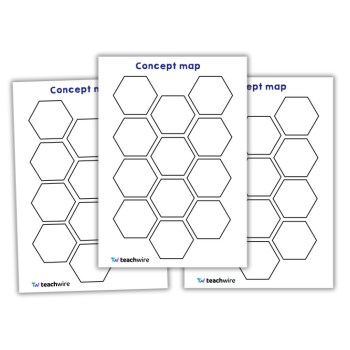KS1, KS2, KS3, KS4
Years 1-11
This free, printable hexagonal concept map template is a versatile and visually engaging tool that you can use to help students explore connections between ideas.
Unlike traditional linear mind maps or lists, this concept map template allows for a more dynamic representation of relationships.
Each hexagon in the concept map template acts as a self-contained unit of information, but the shape’s ability to tessellate enables students to arrange and rearrange ideas to explore how they interconnect.
Benefits of using concept maps
One of the main benefits of using a hexagonal concept map is that it encourages critical thinking. Students must consider not only what ideas are relevant but also how they are related.
For example, in a science lesson, you might provide a concept map template labelled with terms like “photosynthesis,” “sunlight,” “chlorophyll,” and “oxygen.” Students can then link these together to visualise the process and its dependencies.
This format also supports collaborative learning. Groups of students can work together to discuss and negotiate the placement of hexagons, fostering dialogue and deeper understanding.
Because hexagons can be moved around, the concept map template becomes a flexible tool for brainstorming or revising concepts.
You might use it to review prior knowledge, consolidate learning or assess students’ understanding of a topic.
Cross-curricular links
Moreover, concept map templates are particularly effective for cross-curricular links. In English, students might explore themes and character connections in a novel.
In geography, they could examine interrelated factors such as climate, population and trade. The spatial layout helps students to see patterns and recognise the multifaceted nature of topics.
In summary, concept maps are an adaptable and interactive resource that promotes critical thinking, collaboration and creativity.
Their flexible design make them suitable for a wide range of subjects and activities, offering you an innovative way to deepen students’ understanding of complex ideas.
Read more about how to use concept maps to assess knowledge.











